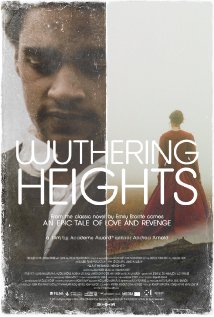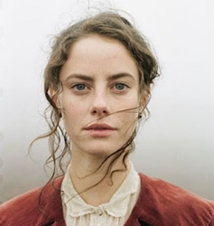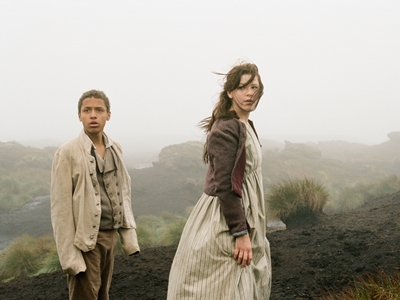Wuthering Heights/2011/Oscilloscope Laboratories/128 min.
I often think of Scarlett O’Hara as the 19th Century prototype for a femme fatale. But I could just as easily make a case for Cathy Earnshaw, the willful, pragmatic and unconventional heroine of “Wuthering Heights,” Emily Brontë’s 1847 novel, set in the remote and mysterious English moors in the late 1700s.
Though lots of literature’s leading ladies (including Scarlett) have juggled two men on the sly, Cathy is completely up front in her decision to have her cake and eat it too. She will marry wealthy local landowner Edgar Linton in order to live in comfort and style. But she sees no reason to forsake her intimate friendship with Heathcliff, her treasured companion from childhood, a gypsy orphan whom her father adopts. So, she doesn’t.
And in some ways, the characters in “Wuthering Heights,” a strange, visceral love story that’s also a tale of revenge with an undercurrent of violence, prefigure some of the warped relationships we see 100 years later in film noir.
Director Andrea Arnold’s version of what she calls “an unsettling, troubling book” is a spare, stark and unrelenting depiction of the dark classic. “I wanted to honor the essence of the book but give myself some room to explore and meander in their childhood,” said Arnold at a recent roundtable. “I try my best not to explain everything.”
Brontë’s novel has been adapted many times in many forms – most famously by William Wyler in 1939, with Sir Laurence Olivier and Merle Oberon, and in 1992 by Peter Kosminsky, starring Juliette Binoche and Ralph Fiennes. There’s also a Monty Python version called “The Semaphore Version of Wuthering Heights.”
In Arnold’s film, the young, madly devoted lovers are played by Shannon Beer and Solomon Glave. Kaya Scodelario and James Howson play the older Cathy and Heathcliff. Lee Shaw is particularly chilling as the abusive Hindley (Cathy’s brother). Beer, Glave and Howson make their acting debuts here. Says Arnold: “I have this fascination with authentic faces. I trust in cinema that a face can tell you things.”
This “Wuthering Heights” has minimal dialogue, no score, rough camerawork and a great deal of cruelty, to animals as well as people. Arnold makes the decision not to focus on exposition and thankfully avoids shaping the story to be “accessible.” Instead, with rugged images, rich textures and stinging performances, Arnold evokes a feeling of what life might have been like at that time – wild and brutal, isolated and tedious, and often short (Brontë died in 1848 at 30) – but also perhaps coolly purposeful and fiercely in the moment.
“Get over it, move on,” a modern audience might urge Heathcliff. But taking that attitude misses the point. In choosing to cling so stubbornly to the raw, singularly flawed passion he feels, he surrenders to the fact that its failure and triumph define him.
“Wuthering Heights” opens today at the Nuart Theatre in Los Angeles.













From FNB readers